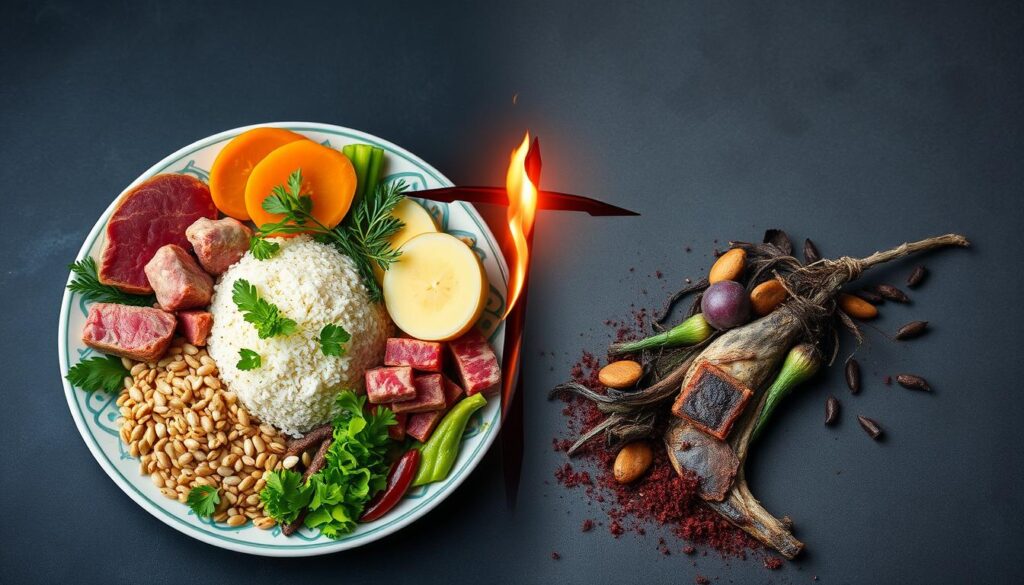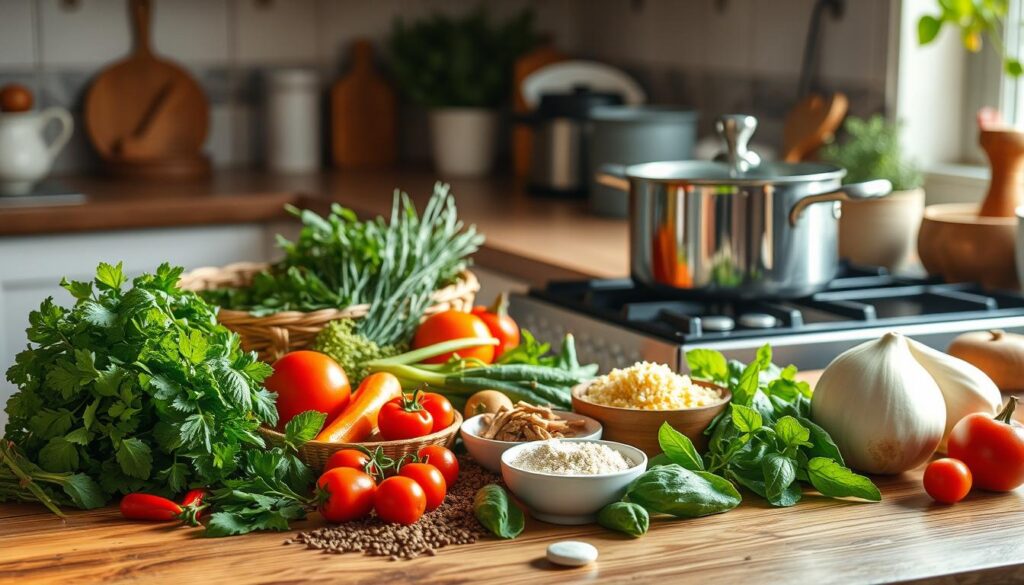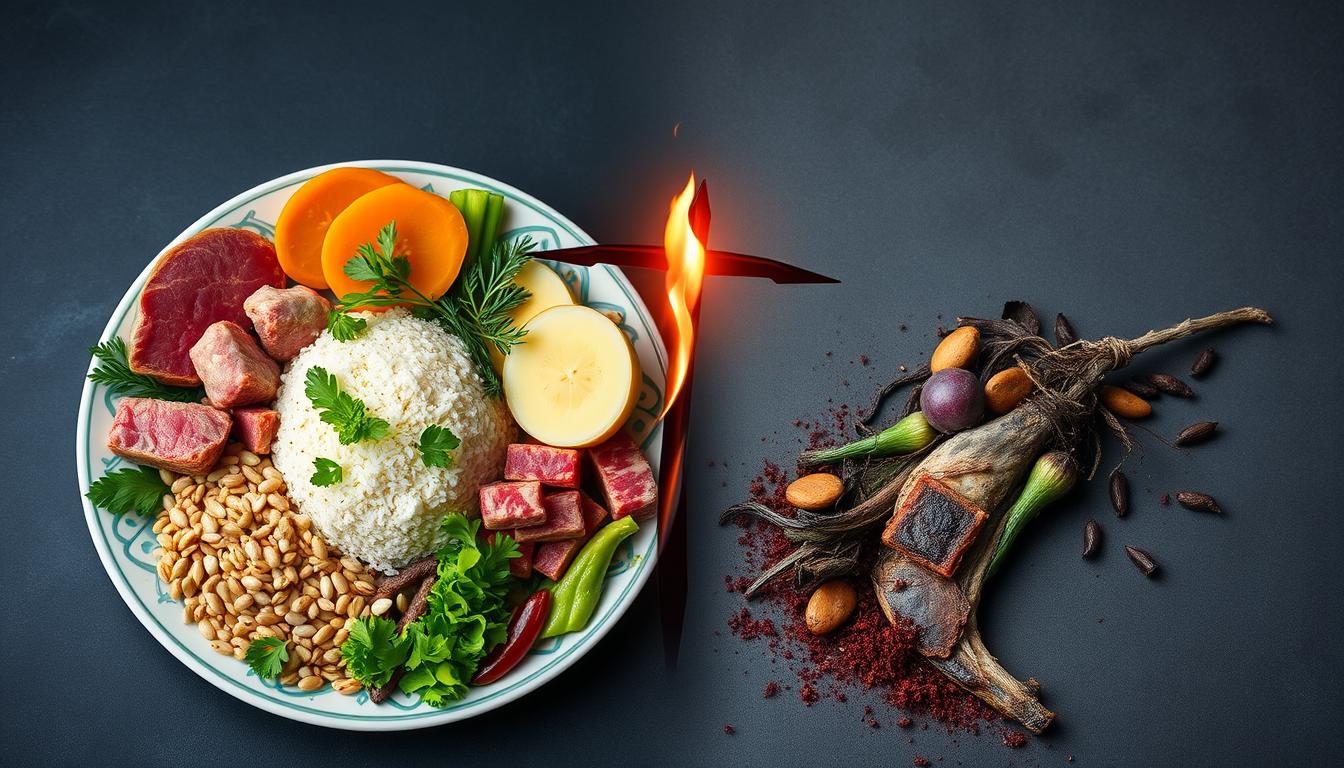Islam is the world’s second-largest religion with over 1.9 billion followers. It has strict rules about what to eat and drink. These rules are based on the Quran, which tells Muslims what is okay and what is not.
Welcome to checkreligion.com
Muslim Meat Restrictions !
Halal foods are okay to eat. Haram foods are not. These rules affect what Muslims eat every day. They even guide choices about fruits and meats.
During Ramadan, Muslims fast from dawn to dusk. They think about these food rules and grow spiritually. Learning about these rules helps me understand and respect Muslim food traditions.
Key Takeaways
- Halal refers to foods that are permissible in Islam, while haram denotes what is forbidden.
- Muslim meat restrictions play a crucial role in promoting health and communal well-being.
- The Quran provides specific guidance on dietary laws that influence Muslim eating habits.
- During Ramadan, fasting encourages spiritual reflection and adherence to dietary law.
- Halal certification is vital for ensuring compliance with Islamic dietary restrictions.
- Understanding these guidelines fosters respect and awareness between cultures.

The Importance of Dietary Laws in Islam
Dietary laws in Islam are more than rules. They help us grow spiritually and bring us together. By following these laws, I do what’s right and stay healthy.
When Ramadan comes, fasting becomes very important. It cleanses my soul and teaches me self-control. I eat a big meal before dawn and then fast all day.
At sunset, I break my fast with iftar. This strengthens my faith and connects me with others.
Dietary laws in Islam are about living fully. They teach us to care for others and appreciate life. By following these laws, I learn to live with balance and respect.
Understanding the Terms: Halal and Haram
Halal and haram are key in Islamic culture. They tell us what we can and can’t do, especially with food. Knowing these terms helps us understand Muslim dietary practices.
Definition of Halal
Halal means something is okay under Islamic law. It includes foods like bread, fruits, and seafood. Meat must be slaughtered by a Muslim to be halal.
With 1.8 billion Muslims following these rules, knowing what’s halal is important. It helps them trust their food.
Definition of Haram
Haram means something is not allowed. It includes pork, some meats, and alcohol. These rules help Muslims choose the right foods.
Knowing what’s haram helps them stay true to their faith. It keeps their diet in line with their beliefs.
Permissible Meat in Islam
In Islam, some meats are okay to eat. These are called halal meats. They come from animals that are okay to eat. This includes animals that eat plants and animals like cows, sheep, goats, and chickens.
The way these animals are killed is important. It’s called dhabiha. Animals are treated kindly and a prayer is said. This makes the meat halal.
Many Muslims check food labels carefully. They look for gelatin or additives from non-halal sources. This shows they want to follow their faith in what they eat. You can find halal meat in stores that sell ethnic foods and some big grocery stores.

| Type of Meat | Halal Status | Notes |
|---|---|---|
| Cattle | Permissible | Must be slaughtered according to dhabiha. |
| Sheep | Permissible | Same slaughtering method applies. |
| Goat | Permissible | Required to follow halal practices. |
| Poultry | Permissible | Must be humanely slaughtered. |
| Pork | Not Permissible | Strictly forbidden in Islam. |
| Carnivorous Animals | Not Permissible | Including birds of prey. |
Muslim Meat Restrictions: What Can Muslims Eat?
Learning what Muslims can eat opens up a world of tasty food. It follows halal dietary rules. A good diet includes fruits, veggies, grains, halal meats, and seafood. Knowing these rules helps Muslims make good food choices.
Halal foods must meet strict rules. Animals must be slaughtered in a special way. It’s important that halal food doesn’t mix with non-halal stuff. Knowing what’s okay to eat shows a commitment to following dietary rules.
- Fruits and vegetables
- Grains and legumes
- Seafood
- Halal-certified meats, like chicken, beef, and lamb
Non-halal foods, or “haram,” include pork and its products, alcohol, and animals not killed the right way. Many Muslims buy halal products at ethnic stores, some restaurants, and big grocery stores.
| Food Category | Halal | Haram |
|---|---|---|
| Meat | Beef, Chicken, Lamb (properly slaughtered) | Pork, Animals not slaughtered according to guidelines |
| Seafood | All Seafood (except for certain types) | None |
| Fruits & Vegetables | All fresh fruits and vegetables | None |
| Grains | Rice, Wheat, Barley (unprocessed) | Processed grains with non-halal ingredients |
This variety lets Muslims eat healthy, tasty meals. By knowing what they can eat, they focus on good, halal food.
Prohibited Foods: The Haram Food List
Knowing the haram food list is key for those following Islamic dietary rules. These rules tell us what foods are not allowed. This can be tricky, especially when we eat out or try new foods.
The main foods banned in Islam are:
- Pork and all its parts
- Animals not killed the right way
- Blood, seen as dirty
- Carnivorous animals and birds that hunt
- Dead animals, seen as unclean
- Drinks that get you drunk, like alcohol
- Fish without scales
Islamic rules say we should eat only clean, pure foods. This helps our body and soul stay healthy. By following the haram food list, I make sure my food choices match my beliefs.

| Food Category | Examples |
|---|---|
| Pork | Pork meat, bacon, gelatine |
| Improper Slaughter | Animals not slaughtered according to Halal standards |
| Intoxicants | Alcohol, certain drugs |
| Carnivorous Animals | Lions, tigers, dogs |
| Birds of Prey | Eagles, hawks, vultures |
| Impurities | Blood, urine, feces |
| Dead Animals | Roadkill, improperly stored meat |
Halal Certification and Its Importance
When I pick what to eat, halal certification is key. It shows products follow Islamic food laws. This matters a lot to the 2 billion Muslims who want to eat right.
Halal food rules are clear. You can’t eat alcohol, blood, or meat from certain animals. Knowing these rules helps everyone follow Islamic food laws.
Halal rules cover what you can eat, what you can’t, and how to handle food. Groups like the Halal Food Standards Alliance of America check these rules. They make sure meat is good and animals are treated right.
But, some people get it wrong. They think halal just means it’s for Muslims. Or they think it’s easy to get. But, getting halal certified is hard. It means the meat is clean and animals are treated well.
The demand for halal meat is growing. More people want to eat meat that’s right. Local butchers and markets offer fresh halal meat fast. This helps everyone make healthy choices.
The Islamic Guidelines for Slaughtering Animals
It’s important to know about Islamic slaughtering rules. These rules show the value of halal practices in the Muslim world. The dhabiha method is key, focusing on kindness to the animal.
This method cuts the animal’s throat quickly with a sharp knife. It makes sure the animal feels little pain.
To do halal slaughter, you must say, “Bismillah, Allahu Akbar.” This says the animal’s life is important. It reminds us to treat animals with care.
Halal slaughter is about being quick and kind. Animals like cows, sheep, goats, and chickens are okay to eat. But, you can’t eat meat from animals that eat meat or birds of prey.
Seafood is mostly okay, but some like shrimp are debated. The halal way makes sure the animal’s blood is drained. This makes the meat clean and good to eat.
The Islamic rules make sure the meat is treated well. This makes the meat healthy and liked by many.
Comparing Kosher vs Halal Foods
Kosher and halal foods have some similarities and differences. Kosher foods follow Jewish laws, while halal foods follow Islamic law. Knowing about these helps us learn about different cultures and their values.
Kosher laws say you can’t mix meat and dairy at the same meal. But halal diets don’t have this rule.
- Halal diets don’t allow alcohol and pork.
- Kosher diets don’t allow shellfish, pork, and certain animal parts.
Kosher meat must be butchered by a special person and soaked before cooking. Halal meat also has strict rules, like a health check before slaughter. Both kosher and halal have prayers before slaughter, showing its spiritual importance.
| Criteria | Kosher | Halal |
|---|---|---|
| Combination of Meat and Dairy | Not Allowed | Allowed |
| Prohibition of Alcohol | Permitted if Kosher | Not Allowed |
| Permissible Seafood | Only fish with fins and scales | Any edible saltwater or freshwater creatures |
| Blood Consumption | Not Allowed | Only blood is prohibited |
| Slaughter Method | By a shochet with prayer | With recitation of Allah’s name |
Both kosher and halal care about treating animals well. This shows their shared values. As more people try these foods, knowing about them helps us all get along better.
How to Identify Halal Products in Grocery Stores
Looking for halal foods is easy when you know what to look for. There are about 1.8 billion Muslims worldwide who follow halal diets. Stores now have special halal sections to help.
Look for halal logos on labels. These logos have a green circle with a white crescent moon and star.
Reading ingredient lists is also important. When eating halal meat, it must be slaughtered the right way. Gelatin is a big worry because it often comes from pork.
But, gelatin from fish, chicken, or cows is okay. If you’re not sure where it comes from, it might not be halal.
- Watch for common non-halal ingredients:
- Alcohol or any ingredient ending with -ol
- Animal shortening like lard or suet
- Carmine, a red dye from crushed cochineal insects
- Casein, a milk protein
- L-cysteine, sometimes derived from human hair
Some food additives and preservatives come from animals. Look out for E441 and E407, which mean gelatin is present. Also, be careful with vegetable glycerin and beeswax.
Choose products labeled as “100% Natural” and check organic items carefully. Halal certification groups like MCGFP and IFANCA help ensure food is halal. By checking labels and knowing where ingredients come from, you can shop for halal foods with confidence.
Cultural Perspectives on Muslim Dietary Practices
The Muslim world is full of different traditions. These traditions come from many ethnic backgrounds. As Muslims grow fast, knowing about halal is key.
Halal is more than food rules. It shapes who Muslims are and how they live together.
Every ethnic group has its own food ways. This makes halal different in each place. For example, Middle Eastern food often has lamb. South Asian food has lots of spices with beef or chicken.
Big meals happen during special times like Eid or weddings. These meals show how food brings people together.
Fasting in Ramadan is a big part of Muslim life. It’s good for the soul but can be hard on the body. Doctors must understand this to help Muslims better.
Following halal means being careful with what you eat. Id-ul-Adha is a big celebration where animals are sacrificed. This act helps people feel connected and shows the value of helping others.
Learning about halal helps us see how food shapes Muslim identity and community.
Conclusion
We looked at what Muslims eat and why. Halal and haram rules are key for them. They help Muslims feel closer to their faith.
These rules also make people healthier and treat animals better. They bring Muslims together.
The halal food market is growing fast. It’s set to hit US$1.67 trillion by 2025. This shows more people want halal food.
With more Muslims coming, knowing about halal is crucial. It’s good for businesses too. They can reach more customers who care about what they eat.
Halal food is not just for Muslims. It’s for anyone who wants healthy, fair food. This makes everyone happy.
Halal practices help us understand each other better. They make our world more interesting. They help us live together better.
FAQ
What does halal mean in relation to dietary restrictions?
Halal means what is okay to eat in Islam. It includes meat and other foods. All food must follow Islamic law.
What foods are considered haram?
Haram foods are not allowed in Islam. This includes pork, animals not slaughtered right, blood, and birds of prey. Also, alcohol is haram.
Can Muslims eat seafood?
Yes, most seafood is okay to eat if it’s from clean sources. But, rules can differ in different Muslim groups.
How can I tell if meat is halal?
Check for halal certification on the meat package. It shows the meat was slaughtered the right way. Also, read the ingredients to make sure there’s no forbidden stuff.
What is dhabiha?
Dhabiha is how animals are slaughtered in Islam. It involves saying God’s name and treating the animal kindly. This makes the meat halal.
Are there specific guidelines for fasting in Islam?
Yes, fasting is a big part of Islam. During Ramadan, people don’t eat or drink from dawn to sunset. They break their fast with iftar.
What is the difference between kosher and halal?
Kosher and halal both care about how food is made. But, kosher comes from the Torah, and halal from the Quran.
How does halal certification help consumers?
Halal certification tells people the food is okay for Muslims. It helps them choose the right food when they shop.
What are some common halal practices among different cultures?
Different cultures have their own ways of following halal. They share meals during special times. This shows their Muslim identity.
Are there guidelines for animal treatment during slaughter?
Yes, Islam teaches to treat animals kindly before and during slaughter. This makes sure the animal feels as little pain as possible. It’s part of being halal.

